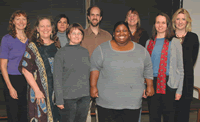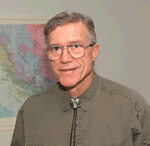|
CURRICULUM
& INSTRUCTION
Teaching for Social Justice

Wade (back row, far L) brings together the country's best social justice teachers.. |
It takes a village to raise a child, but as Mary Cowhey pointed out, it also takes a village to teach first grade. Cowhey, a teacher from Northampton, Massachusetts, came to campus as part of a teaching panel to share strategies for teaching social justice in elementary classrooms including teaching human rights in social studies curricula, creating socially just classroom communities, and involving students in social action projects in the school and the community.
With a $10,000 National Council for the Social Studies grant, Professor Rahima Wade organized the two-day workshop “Teaching for Social Justice,” which drew K-12 teachers from New York, Pennsylvania, Massachusetts, Ohio, Colorado, and throughout the Midwest.
As part of the workshop, a social justice teaching panel—consisting of 10 the country’s best social justice elementary teachers—shared personal experiences and advice. These creative teachers face the same challenges with which all teachers are familiar—lack of funds and materials, uninspired textbook teaching plans, and simple classroom apathy. But experts like Sasha Wilson, a teacher in the Bronx, and Mary Salazar Guenther, a teacher in Cedar Falls, are able to successfully combat these obstacles, while working within the constraints of their school situations.
A ribbon of commonality ran through the panelists’ varied stories—hands-on, creative approaches to academic subjects are the most successful.
“Start with a teacher’s passion or a student’s question, find allies, and teach for change,” says teacher Amika Kemmler-Ernst from Boston. “It’s possible whether it’s in the curriculum or not. “
When it comes to allies, the panel suggests teachers think globally and act locally.
When Cowhey’s school organized a food drive, she organized all of her lesson plans around the drive. For health and nutrition, they studied the food groups. For social studies, they learned how many people in their city, country, and world go hungry each day. For math, the students counted, weighed, and cataloged the cans. Then they had to figure out how far away the shelter was and how to get the cans to their destination. Her students brainstormed and traveled to the shelter in a parade of borrowed strollers and shopping carts. “It was hands on,” Cowhey said, “and the students did it themselves every step of the way.”
A little bit of inspiration goes a long way.

McLure, a Man of Broad Interests, Retires
 Associate Professor John McLure
Associate Professor John McLure |
This summer, Curriculum Associate Professor John W. McLure will retire after 35 years of service. Before joining the College of Education faculty in 1969, he had taught in junior and senior high schools in Alabama and Illinois and had been a school counselor, assistant principal, and adult education teacher.
As a generalist in secondary curriculum, McLure helped students envision the interdisciplinary nature of learning and explore issues in specialty areas. He has published in journals for teachers of science, social studies, English, math, home economics, physical education, counseling, equity, curriculum design, and more.
“I love working with students of any age,” McLure said. “There is so much that can be done to improve learning across disciplines.” He has helped teachers find ways to extract and explain high level concepts to children at different levels of their schooling.
“Like a double helix,” McLure said, “high-level learning ideas should be introduced and reintroduced over the school years.”
McLure has kept in touch with school curriculum by visiting schools as part of North Central Accreditation teams. “NCA visits help schools maintain balance, strength, and equity in the curriculum,” he said.
McLure’s work with middle school science teachers to develop new, hands-on activities has helped to peak students’ interests in science. He takes such efforts to a broader audience by serving as senior executive editor of the Science Activities journal.
His work also included developing democracy-building curricula for post-Soviet nations, surveying the junior high to middle school movement in the upper Midwest, and educational gaming and simulation. His most popular game, Puzzle: A Simulation of a Biographer’s Tasks, helps students learn to make historic judgments.
“The Puzzle project is the most scholarly simulation we have produced,” Paul DeKoch, co-founder of Interact Co., who published the game, told McLure.
An exercise program for elderly Iowans that McLure and Physical Education Associate Professor Emeritus David Leslie (PhD ’70) created in the 1970s is still being used in 19 of the 20 sites where it was introduced. It led to changes in teaching physical education.
“John’s a man of great curiosity and broad interests,” Leslie said. “He is creative and imaginative—great assets to have when breaking new ground.”
Doctoral student Barbara Sands, who has team taught two courses with McLure, says he has been an exemplary mentor. “His commitment to helping students both inside and outside of the classroom is phenomenal,” she said. “Dr. McLure has a genuine interest in students and their experiences at The University of Iowa.”
Always an inspiration, McLure’s ideas and compassion make a strong impression. “He has given me my wings to fly,” Sands said.

|